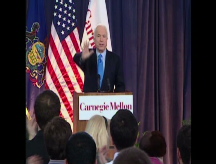Bush: 43M families hurt if tax cuts expire
President also says small business owners will take a hit if lawmakers fail to extend his 2001-03 tax relief. But critics say that's not necessarily the case.
NEW YORK (CNNMoney.com) -- President Bush on Monday called on lawmakers to make his 2001 and 2003 tax cuts permanent or risk what the White House has tagged "the largest tax increase in history."
Allowing the cuts to expire would add $1,900 to the tax bill of a family of four with an annual income of $60,000, Bush said. All told, he added, 43 million families with kids would have to pay an average tax increase of $2,323.
"It means a lot if you're trying to save for your family," Bush said. "It means a lot if you're worried about gas prices. It means a lot if you're a hardworking American family."
But the political reality is that it's unlikely the tax cuts would be allowed to expire for low- and middle-income families, who have been hurt by the economic slowdown and the rise in food and gas prices.
"No one wants to see them all expire - it would be a large tax increase," said Roberton Williams, principal research associate at the Tax Policy Center and the former deputy assistant director for tax analysis at the Congressional Budget Office.
While Bush has campaigned for years to permanently extend the cuts - all of which sunset by 2011 - his successor will be on the hot seat when Congress debates the issue. And none of the candidates hoping to succeed him has called for tax increases on lower- and middle-income families.
Presumptive Republican nominee John McCain has called for the extension of all the tax cuts, while his Democratic rivals Barack Obama and Hillary Clinton have proposed extending them for everyone except high-income taxpayers.
Small business impact
Supporters of the tax cuts contend that letting them expire - even if only for high-income taxpayers - can be detrimental to the economy.
"It turns out that 75% of taxpayers who benefited from the reduction of the top bracket were small business owners," Bush said, noting that small businesses pay taxes at individual income tax rates. "So when you hear 'tax the rich' you're really talking about taxing Mom and Pop businesses."
Williams said that it's true that the majority of taxpayers in the top income tax bracket (currently 35%) report business income, but those taxpayers don't represent the majority of small business owners.
According to a Tax Policy Center analysis, over 90% of small business owners report income that puts in them in the 26% tax bracket or below.
Many of the top-bracket taxpayers who report self-employment income get most of their income from salaries, investments and stock options, Williams said. Of those taxpayers, only 50% make more than half of their total income from their business, and 25% get less than a tenth of their income from their small business, he said.
Supporters of the tax cuts contend that allowing them to expire can have the adverse effect of reducing expected tax revenue for the government. Their argument: Americans would have less incentive to make more money and instead step up their efforts to avoid paying tax at all.
With the tax cuts in place, tax revenue made up 18.9% of gross domestic product last year, said Larry Lindsey, who headed the president's National Economic Council in 2001 and 2002, at a panel discussion in Washington, D.C., preceding Bush's remarks. "That's higher than all but 11 of the last 60 years.... The only cause of revenue growth ... is economic growth."
Budget deficit looms
But critics of the tax cuts say Washington simply can't afford them given the budgetary pressures that will result from the war in Iraq, possible changes to the Alternative Minimum Tax and the growth in Social Security and Medicare. As more Baby Boomers retire, economists don't believe the economy can grow enough to offset the anticipated increases in spending on those entitlement programs.
Williams concedes "we don't know how much revenue would go up" if the tax cuts are left to expire. But, he said, "we know the budget deficit will get larger if we extend them." The Tax Policy Center estimates that an extension of the cuts for everyone except high-income taxpayers could cost $783 billion over 10 years.
Tax cut supporters are urging lawmakers not to wait until 2010 to make their decision about Americans' tab with Uncle Sam.
"Imagine if you're trying to plan - plan your life, plan the future for your small business - and you don't know whether or not Congress if going to keep your taxes low," said Bush. "It makes your environment more uncertain."
Of all the arguments in the debate over the tax cuts, that's one with which even critics can agree. ![]()



